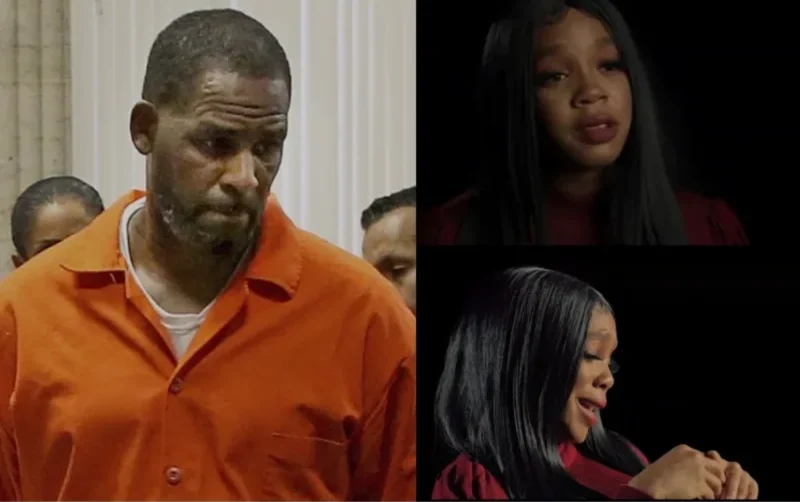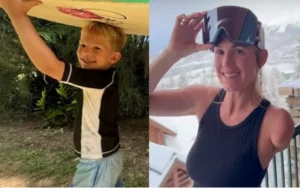Introduction to Joann Kelly’s Allegations
Joann Kelly, daughter of the controversial musician R. Kelly, has recently come forward with grave allegations of childhood abuse against her father. Born into the spotlight, Joann, also known as Buku Abi, has struggled to forge her own identity within the shadows cast by her father’s infamous legal battles and public persona. As the daughter of a prominent figure in the music industry, her upbringing was filled with both privilege and significant challenges, which have shaped her outlook and experiences throughout her life.
Joann’s relationship with R. Kelly has been a complex one, marked by both love and turmoil. Growing up, she faced the difficulties of navigating media narratives surrounding her father while grappling with the realities of familial ties. With R. Kelly’s legal troubles surfacing over the years, Joann has found herself caught in a tumultuous web of public scrutiny and emotional conflict. This challenging dynamic motivated her to finally address the pain caused by her father’s actions, which she alleges began during her childhood.
The timing of Joann Kelly’s allegations is particularly poignant, occurring amidst a wider cultural reckoning regarding abuse and accountability in society. As movements like #MeToo continue to unveil the hidden stories of many survivors, Joann’s courage to speak out stands as a testament to the growing response to familial abuse. Her detailed claims against R. Kelly shine a light on the dark corners of his legacy, prompting discussions around the impact of celebrity status on the lives of those closest to the accused. The nature of Joann’s allegations is not only personal but also reflects broader societal issues, inviting deeper reflection on the complexities of abusive relationships and the long-lasting scars they can leave behind.
Understanding the Impact of Childhood Abuse
Childhood abuse is a critical issue that can significantly affect individuals throughout their lives, leading to a range of emotional and psychological consequences. The impact of abuse within family dynamics can be profound, as the relationships formed during childhood often set the stage for future interactions and coping mechanisms. Survivors of childhood abuse may grapple with a plethora of emotional disturbances, including feelings of worthlessness, abandonment, and trust issues, which can hinder their ability to establish healthy relationships in adulthood.
One of the most prevalent psychological effects of childhood abuse is Post-Traumatic Stress Disorder (PTSD). Survivors may relive traumatic experiences through intrusive memories, nightmares, or flashbacks, reinforcing a cycle of anxiety and fear. PTSD can manifest in various ways, affecting an individual’s day-to-day functioning and overall quality of life. Alongside PTSD, many survivors may experience heightened levels of anxiety, leading to difficulties in managing stress and emotional regulation. This anxiety often influences social interactions, causing isolation and withdrawal from others.
In addition to anxiety and PTSD, childhood abuse can significantly impact an individual’s ability to form and maintain relationships. Survivors may find it challenging to trust others, fearing that intimate relationships will replicate past traumas. This can create barriers in establishing connections with peers, family members, and romantic partners, often resulting in further feelings of loneliness and despair. They may also struggle with setting boundaries, leading to unhealthy dynamics in their interactions.
By understanding the psychological ramifications of childhood abuse, it becomes easier to empathize with the experiences of survivors, such as Joann Kelly. Recognizing these long-term consequences underlines the critical nature of addressing and supporting individuals who disclose their experiences of abuse, creating an environment conducive to healing and recovery.
Public and Media Reactions
The allegations made by Joann Kelly against her father, R. Kelly, have resonated widely across various social media platforms and news outlets. The public response has been characterized by a mixture of shock, disbelief, and a call for accountability, which reflects broader societal concerns regarding familial abuse and its lasting impact. Many users on platforms such as Twitter and Instagram have expressed their support for Joann, emphasizing the importance of believing survivors and recognizing the often-hidden nature of such trauma.
Media coverage of Joann’s allegations has been extensive, with multiple outlets providing in-depth analyses of the claims. This coverage has ranged from sensationalized headlines to thoughtful discussions that examine the implications of the allegations on R. Kelly’s public persona and career. Notably, some news sources have raised questions about the responsibilities of parents in safeguarding their children’s well-being, further complicating the discourse surrounding familial relationships and abuse. The balance between reporting such allegations and respecting the privacy and emotional state of the survivor is a critical ethical consideration that many journalists are navigating when covering this sensitive topic.
Moreover, the conversations triggered within the community are equally significant. Social media has facilitated a space for individuals to share their personal experiences, prompting a collective reflection on the prevalence of abuse in various forms. Hashtags and online campaigns have emerged, advocating for increased awareness and prevention of child abuse. These discussions underscore the importance of public discourse, as they can create a supportive environment for survivors and encourage others to speak out. This heightened awareness may also serve as a catalyst for change, making it essential for society to continue engaging with and addressing the complexities surrounding familial abuse.
Moving Forward: Support for Survivors
Survivors of childhood abuse often face unique challenges, yet numerous organizations and resources are dedicated to assisting individuals in their healing journey. It is imperative for those who have experienced trauma to know that they are not alone and that support is available.
One essential resource for survivors is the National Child Abuse Hotline, which provides confidential support and assistance to individuals in crisis. Trained counselors are available 24/7 to offer guidance, provide information about local services, and help connect survivors to counseling or therapy. Many local communities also have organizations focused on supporting abuse survivors, such as rape crisis centers and domestic violence shelters. These organizations often provide a range of services, including counseling, legal advocacy, and emergency shelter.
In addition to hotlines and local organizations, the internet offers a wealth of information and support. Websites like RAINN (Rape, Abuse & Incest National Network) provide assistance specifically for survivors of sexual abuse. They offer resources, a chat hotline, and forums for survivors to share their stories and connect with others who have faced similar experiences. Online support groups can provide crucial understanding and a sense of community for those grappling with the often isolating effects of childhood abuse.
Community resources also play a vital role in supporting survivors. Many communities offer art therapy programs, support groups, and wellness workshops aimed at fostering resilience and recovery among survivors. Empowering survivors with tools to promote healing, such as mindfulness practices and educational workshops, can significantly enhance their coping strategies and overall well-being.
It is essential for survivors to take the first step towards healing by reaching out for support. Whether through hotlines, local organizations, or online communities, numerous resources are available to assist survivors in moving forward and reclaiming their lives. In conclusion, seeking help is a critical part of the healing process, and a supportive network can make a profound difference in one’s journey toward recovery.




